
Yousef speaking at a rally in front of the Ministry of Defense in New Zealand.
On June 13, I flew from Istanbul to Auckland, catching two long flights to begin my second-ever speaking tour in New Zealand. I had been invited by the Palestine Solidarity Campaign Aotearoa (PSNA) to be the featured speaker on a national tour about AFSC’s history in Gaza/Palestine, our current work, Gaza’s history and the current reality of genocide. My first speaking tour in New Zealand was in 2013 as part of the National Conference on Palestine. This time, I was invited as the Gaza Coordinator at the AFSC to talk about the ongoing genocide and the books I had contributed to over the past three years.
The speaking tour kicked off in Wangarie to the north of Auckland on Monday, 16 June 2025 at St John's Church Hall. The audience of 130 people were mostly supportive of Palestine and eager to hear my presentation. Though a few people came to disrupt, I was able to maintain a focus on our work and counter their disinformation. I talk about the AFSC history in Gaza, the history of Gaza and its refugees and the current reality of genocide, mingling this with my family’s own history as refugees in Gaza. All talks I gave in New Zealand were public presentations without PowerPoint presentations! At seven of my speaking engagements, Māori people welcomed me in their native language, performing songs and the traditional Hakka dance.

Yousef speaking in Wangarie on 16 June 2025 at St John's Church Hall.
On Tuesday, 17 June 2025, I traveled to Waitangi/Kerikeri by car—the landscape was beautiful over a three-hour-ride. I gave a talk at the Tahuaoa Function Center on Waitangi Treaty Grounds. The talk was attended by Māori students from a high school in the area with their teacher along with dozens of other people. They performed Hakka and other songs to welcome me. A Māori woman who visited Palestine spoke at the event as well, and she told the audience how Palestinian Bedouin women also have tattoos under their chins just like Māori women.

Meeting Māori students at the Tahuaroa Function Center on Waitangi Treaty Grounds.
Prior to the talk, I visited the Waitangi Grounds Museum and Te Rau Aroha Museum of the Price of Citizenship. I learned about what the British Crown did in New Zealand—promising people who fought on behalf of the Crown in other parts of the world including in Palestine and Egypt the right to citizenship. France made the same promise to those who fought in Algeria and both France and Britain failed to act on their promises after the ends of the wars.

Waitangi Treaty Grounds, Māori cultural performance.
On Wednesday, 18 June 2025, I flew from Kerikeri to New Plymouth. I gave a talk at the Tasman Social Club inNew Plymouth. The talk was attended by over 100 people, and I was also welcomed by a Māori leader. I was amazed by the questions from the audience. Attendees linked their own struggles in Latin America and other parts of the world with the genocide, starvation, and occupation in Palestine.

Speaking at the Tasman Social Club, New Plymouth.
On Thursday, 19 June 2025, I travelled to Whanganui by car with my Quaker host to stay at a Quaker community. I spoke at a book release of I Must Die at Paige’s Book Gallery. All the books sold out. If I Must Die includes the poetry and prose of late Palestinian intellectual Dr. Refaat Alareer, written over 13 years. I also shared with the people there AFSC’s newest book, Displaced in Gaza, an anthology of 27 stories of displacement collected in May of 2024. On the same day, I gave another talk at The Davis Lecture Theatre, attended by over 50 people. People were curious about the level of starvation on the ground in Gaza and how people survive day to day.

Speaking at Paige’s Book Gallery.
In the morning, I had breakfast with around 15 Quaker community residents, most of whom are Quakers. There are 400 Quakers in New Zealand, and the majority of them live in Auckland.

Having breakfast with the Quaker community in Whanganui.
On Friday, 20 June 2025, I flew to Tauranga. My host, Dale Frew drove for 3 hours to a town called Thames where I spoke at a school to a group of parents and Māori community figures. I was not fully prepared for a 3-hour drive after my flight, and I took some naps on the way! In Thames, I was again welcomed by a group of Māori leaders who gave me a hongi, the traditional Māori greeting on the face. The talk was attended by over 100 people, and the audience was friendly and very much interested to learn. I lingered after the talk, speaking to people who still had questions.

Speaking to a community of parents and educators at a high school in Thames.
On Saturday, 21 June 2025, I spoke at Tauranga at the Institute of Technology. We had a crowd of 80 people, and the audience was diverse, with many young people and college students. After my talk, some students approached me and offered me a hoodie as a gift. We exchanged contact information as they were eager to have me speak again to their community.

Speaking at Tauranga at the Institute of Technology.
On Sunday, 22 June 2025, I flew to Christchurch and attended a dinner at the house of John Minto, a long-time anti-apartheid activist and the co-chair of PSNA, the group that hosted me in New Zealand.

Dinner with local activists in Christchurch
On Monday, 23 June 2025, I gave a talk at the WEA Canterbury Workers' Educational Association. It was attended by a group of 100 people, once again an incredibly engaged and interesting audience. Asked my thoughts on what people should do to push politicians, I encouraged them to demand their National MPs support a draft resolution in parliament calling for an embargo on Israel.
While in New Zealand, on Monday, 23 June 2025, I gave two online presentations to people in Germany and Italy. My first talk was joined by Palestinian journalist Muhammad Shehada, and hosted by students at the Philipps-Universität Marburg. A group of 40 students and Zionists tried to get it cancelled but failed to censor me and Muhammad. The next day, I also spoke online to a group of activists in Rome, Italy about Gaza and an anthology I contributed to entitled Gaza Writes Back. The talk was organized by the publisher of the Italian version of Gaza Writes Back in order to launch the Italian version.
After the online presentation to activists in Rome, I spoke at Kura, which means nest, in Christchurch. Kura is a Māori school that fosters understanding and appreciation of Māori language and culture among the students. The students were a bit shy, as it was their first time learning about Palestine and Gaza. Their teacher asked questions drawing parallels between what happened (and is still happening) to Māori people at the hands of colonization and what is happening in Palestine. The students were shocked listening to my presentation on the realities of occupation, displacement, land confiscation, and genocide in Palestine, as well as my own personal story of life under Israeli occupation.
That day, I also visited Al-Nur Mosque, the site of the shooting that killed 51 Muslims in New Zealand in 2019. I spoke after the Sunset prayer for 10 minutes about Gaza. People came and shook hands after my talk, telling me they are doing their best to send donations to help people in Gaza. I urged them to take action at a political level by pressuring their own MPs and government on Gaza. After the service, I visited the parents of Atta Elyan, a Palestinian with family in Jerusalem who was killed in the Christchurch massacre. I was touched by how the family dealt with grief. Atta’s mom, Dr. Maysoon Salama, had started writing short stories for children about dealing with grief.
I also spoke to the Students for Justice in Palestine group at the University of Canterbury. The university has more than 21,000 students, and the student group has been very active in fundraising for Gaza as well as protesting on weekly basis to end the genocide in Gaza.
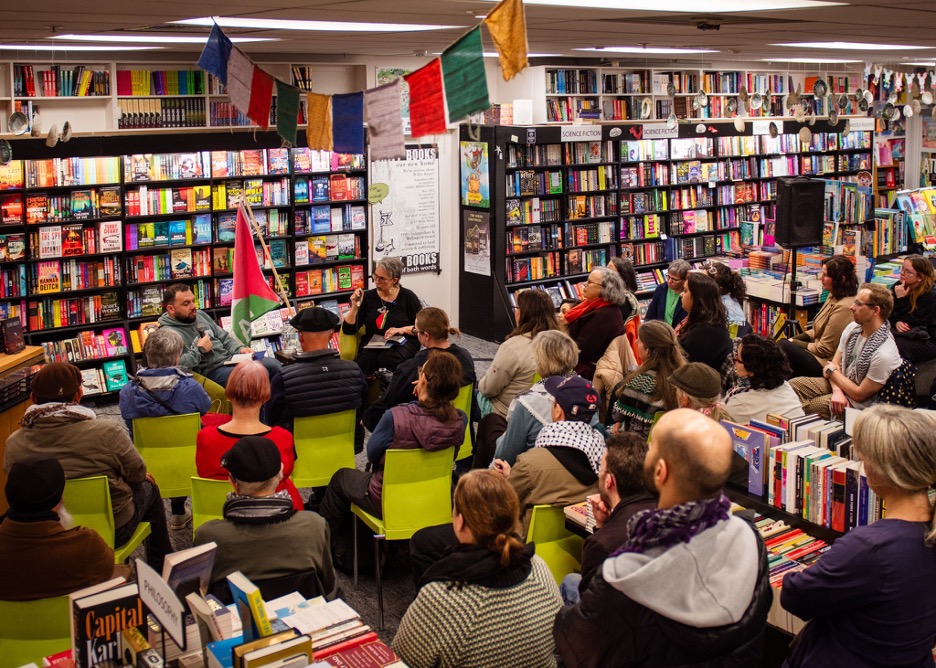
Speaking to a large crowd on If I Must Die at Unity Books in Wellington.
On Wednesday, 25 June 2025, I flew to Wellington. On the first day, I spoke at a rally in front of the Ministry of Defense calling for an end to the Israeli war against Iran. I also spoke at Unity Books about the book I compiled and edited of the works of my mentor, Dr. Refaat Alareer, entitled, If I Must Die. The bookstore was full of people who were eager to learn about Gaza and Refaat’s life. People asked about Refaat’s thoughts on fiction and the power of literature as well as about famine in Gaza and how the genocide has impacted the family unit. At the bookstore, I met the daughters of a famous Māori leader, the former leader of the Māori Wellington tribe. I was also interviewed by Māori Radio and the talk at Unity Books was covered by Radio Wellington. After the rally and bookstore event, I went to the University of Victoria and spoke to a lecture hall with students, faculty and community members. People asked about radical literature and the importance of keeping Palestinian education independent of Israel.
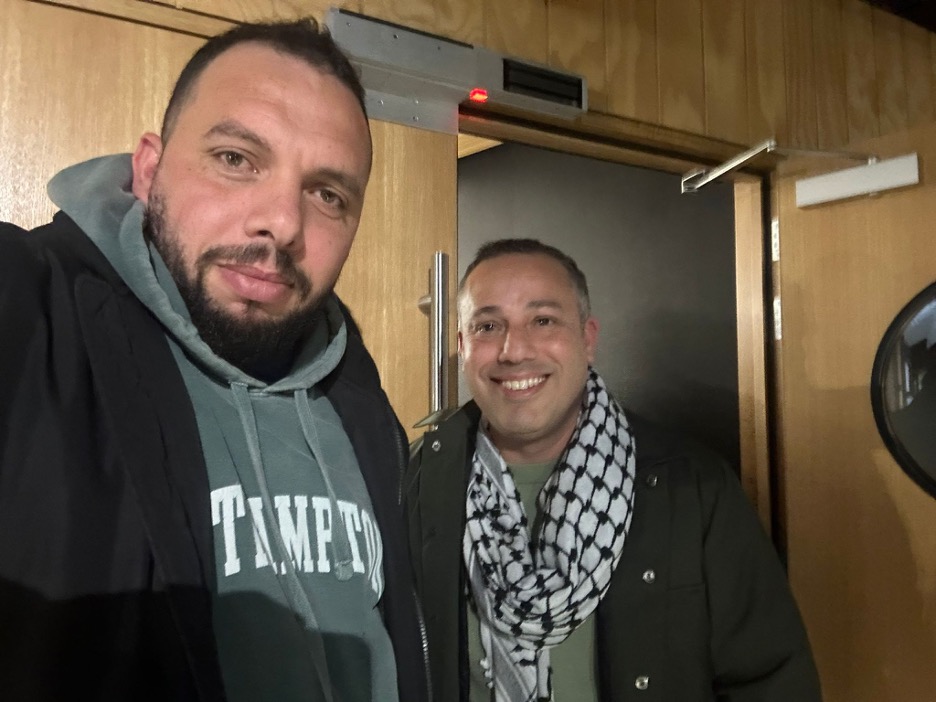
Meeting former AFSC staff Ibrahim Al-Shatali in Wellington.
While in Wellington I had the opportunity to connect with a former AFSC staff member from Gaza, Ibrahim Al Shatil, who is now living in Wellington and working with the Qattan Center.
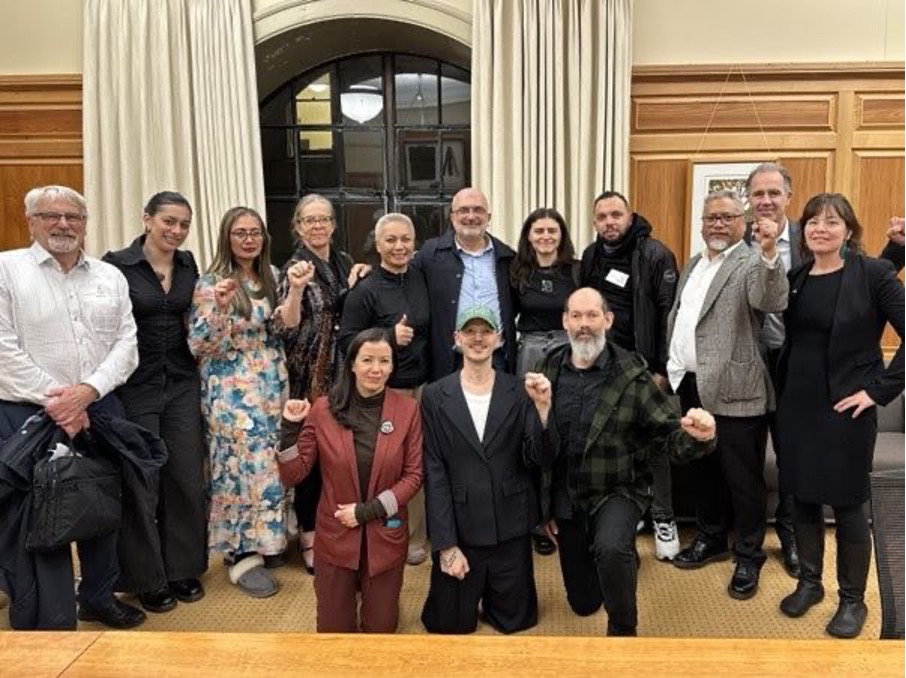
Meeting with Members of Parliament in the Green Party at the New Zealand Parliament.
In Wellington, I also met members of Parliament from the Green Party, the Labour Party, and MPs from the Māori community. I also met an MP from the national party, the ruling party in NZ named Greg Fleming. I spoke about AFSC’s current and historical work in Gaza and urged them to take more action to support Palestinians by creating a humanitarian visa, scholarships, a Palestine studies center, a summer school for native people, and Māori translations of key Palestinian texts. During my meeting with Mr. Fleming, I explained the impact of the Gaza genocide on Palestinian Christians in Gaza in addition to Gaza’s rich Christian history.
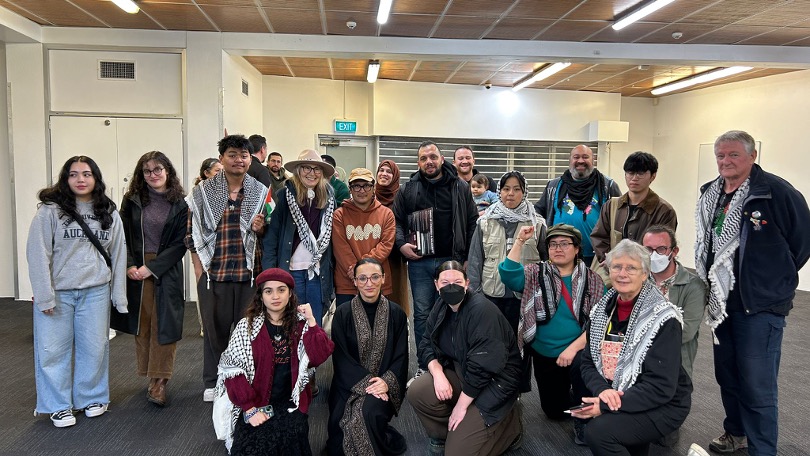
Speaking to a group of activists at the Wellesley Community Center in Auckland.
At the end of June, I returned to Auckland to speak to more university and community organizations, reaching over 200 people at public events. I spoke at the Wellesley Community Center and at the University of Auckland. Everywhere on my tour people wanted to hear more updates about the situation in Gaza and what actions they could take. I also spoke at a Baptist church in Auckland about Palestinian Christians and how the genocide has impacted them. People were emotional hearing about the then-recent killing of 24 Palestinian Christians, and they lit candles to pray for peace in Gaza.
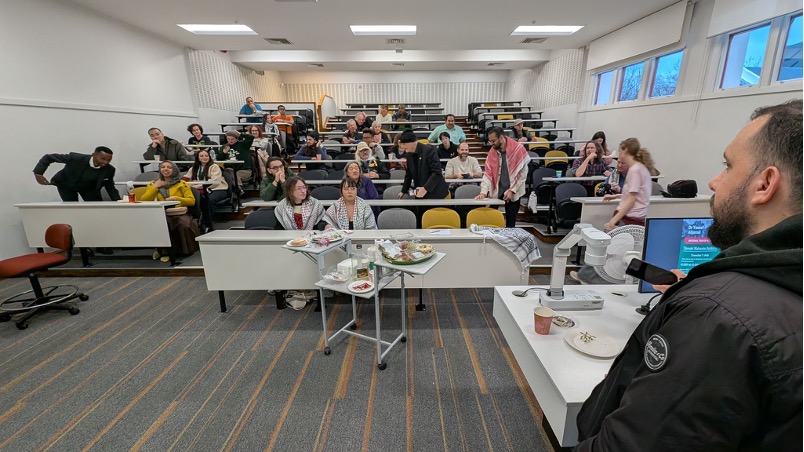
Speaking to students at Auckland University.
While in Auckland, I was interviewed by the Māori TV station. I talked about the starvation in Gaza and the ongoing genocide, and the role of the AFSC in Gaza over the years. I also travelled for two hours to Hamilton to stay for two days and give a talk at the Anglican Action Center. 50 people came to hear about AFSC’s work in Gaza, the books I have worked on, and the realities of life under genocide. The Anglican Action Center provides a place for former prisoners to find community and talk about their past and present experiences. Some of the people I met had never heard of Gaza before October 7, reminding me how much and how quickly Gaza is changing the discourse about justice around the world.
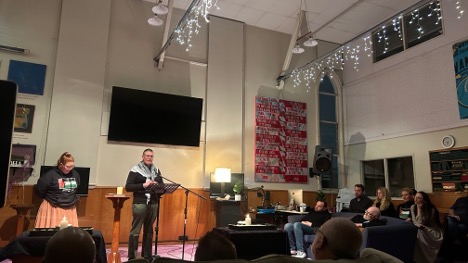
An event at a Baptist church where I highlighted the plight of Palestinians Christians in Gaza.
I then travelled for 3 hours to stay for two days in Rotorua, where I had the opportunity to visit a (living) Māori village, where Māori lifestyle and traditions are maintained today. The chief of the village welcomed me and was happy to see someone from Gaza.
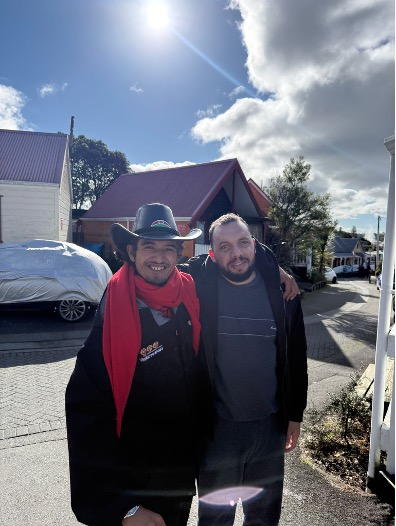
Meeting the chief of the Māori village in Rotorua.
Before I left New Zealand I was interviewed for a popular podcast "The Bradbury Group" which offers analysis of local politics in New Zealand and global politics including the Gaza genocide. The station received some pushback about hosting me, but refused calls by pro-Israeli groups to cancel my appearance, and I was able to share my story with 1,200 people who joined online.
Overall, my visit to New Zealand was excellent and really helped to expand AFSC’s connections with communities who are eager to support the Palestinian cause. A lot of people I met learned about the work and history of the AFSC in Palestine for the first time, including AFSC’s early work in Gaza that helped to create the infrastructure to provide for Palestinian refugees. I’m looking forward to maintaining and building AFSC’s connections to the indigenous Māori people, whose history, culture, and lived experiences I was able to learn so much more about.
Here are some ideas that emerged during my tour:
1. Securing humanitarian visas for Palestinians from Gaza to New Zealand.
2. Raising funds for scholarships for Palestinian students to attend universities and training institutes in New Zealand.
3. Raising funds to support the United Nations Relief and Works Agency (UNRWA) and relief organizations including the AFSC in Gaza.
4. Starting a Palestine Studies Center at a Māori university.
5. Translating Palestinian books into Māori including Displaced in Gaza and Light in Gaza.
6. Organizing a summer school for indigenous people that includes Palestinians.
7. Planning for follow up conversations with New Zealand members of Parliament on the above topics.